ENTREPRENEURSHIP AND SMALL BUSINESS MANAGEMENT Report, UK Focus
VerifiedAdded on 2020/10/22
|15
|5564
|316
Report
AI Summary
This report comprehensively examines entrepreneurship and small business management, covering different types of entrepreneurial ventures such as serial entrepreneurship, intrapreneurship, and owner-manager businesses, and analyzes their characteristics and typologies. It explores the similarities and differences between these ventures, including those in the public and private sectors, with a case study of Marks & Spencer and Asus. The report further delves into the impact of small businesses on the economy, particularly in the UK, highlighting their role in employment, product diversity, and overall economic growth. It also identifies the characteristics, traits, and skills of successful entrepreneurs, examining how personality aspects reflect motivation and mindset. The report also analyzes how personal background and experience can either hinder or foster entrepreneurship. The report concludes with an overview of the scope, development, and growth of entrepreneurial ventures. The report provides a detailed analysis of entrepreneurial ventures, their impact on the economy, and key characteristics of successful entrepreneurs.

ENTREPRENEURSHIP AND
SMALL BUSINESS
MANAGEMENT
SMALL BUSINESS
MANAGEMENT
Paraphrase This Document
Need a fresh take? Get an instant paraphrase of this document with our AI Paraphraser
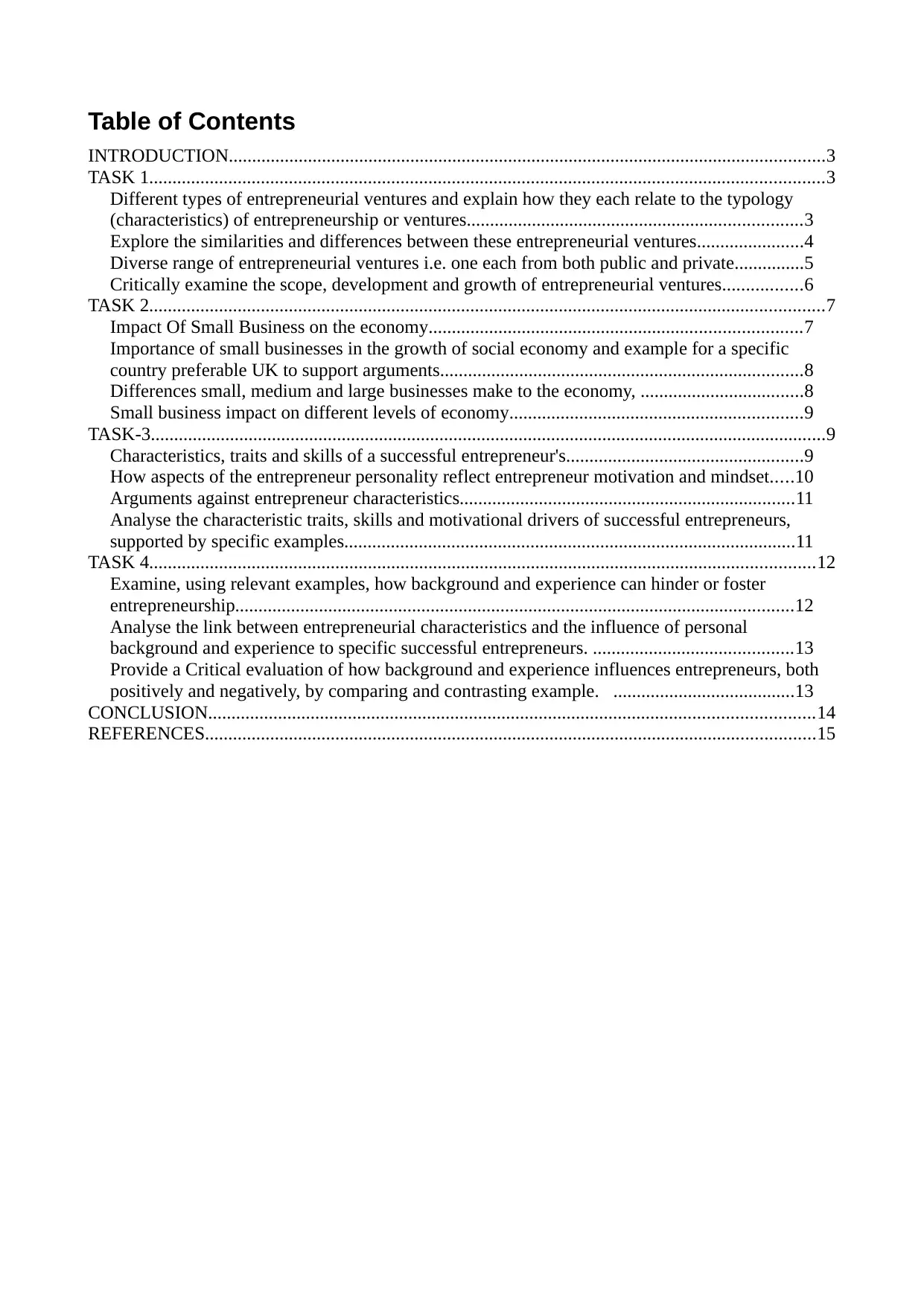
Table of Contents
INTRODUCTION................................................................................................................................3
TASK 1.................................................................................................................................................3
Different types of entrepreneurial ventures and explain how they each relate to the typology
(characteristics) of entrepreneurship or ventures........................................................................3
Explore the similarities and differences between these entrepreneurial ventures.......................4
Diverse range of entrepreneurial ventures i.e. one each from both public and private...............5
Critically examine the scope, development and growth of entrepreneurial ventures.................6
TASK 2.................................................................................................................................................7
Impact Of Small Business on the economy................................................................................7
Importance of small businesses in the growth of social economy and example for a specific
country preferable UK to support arguments..............................................................................8
Differences small, medium and large businesses make to the economy, ...................................8
Small business impact on different levels of economy...............................................................9
TASK-3.................................................................................................................................................9
Characteristics, traits and skills of a successful entrepreneur's...................................................9
How aspects of the entrepreneur personality reflect entrepreneur motivation and mindset.....10
Arguments against entrepreneur characteristics........................................................................11
Analyse the characteristic traits, skills and motivational drivers of successful entrepreneurs,
supported by specific examples.................................................................................................11
TASK 4...............................................................................................................................................12
Examine, using relevant examples, how background and experience can hinder or foster
entrepreneurship........................................................................................................................12
Analyse the link between entrepreneurial characteristics and the influence of personal
background and experience to specific successful entrepreneurs. ...........................................13
Provide a Critical evaluation of how background and experience influences entrepreneurs, both
positively and negatively, by comparing and contrasting example. .......................................13
CONCLUSION..................................................................................................................................14
REFERENCES...................................................................................................................................15
INTRODUCTION................................................................................................................................3
TASK 1.................................................................................................................................................3
Different types of entrepreneurial ventures and explain how they each relate to the typology
(characteristics) of entrepreneurship or ventures........................................................................3
Explore the similarities and differences between these entrepreneurial ventures.......................4
Diverse range of entrepreneurial ventures i.e. one each from both public and private...............5
Critically examine the scope, development and growth of entrepreneurial ventures.................6
TASK 2.................................................................................................................................................7
Impact Of Small Business on the economy................................................................................7
Importance of small businesses in the growth of social economy and example for a specific
country preferable UK to support arguments..............................................................................8
Differences small, medium and large businesses make to the economy, ...................................8
Small business impact on different levels of economy...............................................................9
TASK-3.................................................................................................................................................9
Characteristics, traits and skills of a successful entrepreneur's...................................................9
How aspects of the entrepreneur personality reflect entrepreneur motivation and mindset.....10
Arguments against entrepreneur characteristics........................................................................11
Analyse the characteristic traits, skills and motivational drivers of successful entrepreneurs,
supported by specific examples.................................................................................................11
TASK 4...............................................................................................................................................12
Examine, using relevant examples, how background and experience can hinder or foster
entrepreneurship........................................................................................................................12
Analyse the link between entrepreneurial characteristics and the influence of personal
background and experience to specific successful entrepreneurs. ...........................................13
Provide a Critical evaluation of how background and experience influences entrepreneurs, both
positively and negatively, by comparing and contrasting example. .......................................13
CONCLUSION..................................................................................................................................14
REFERENCES...................................................................................................................................15
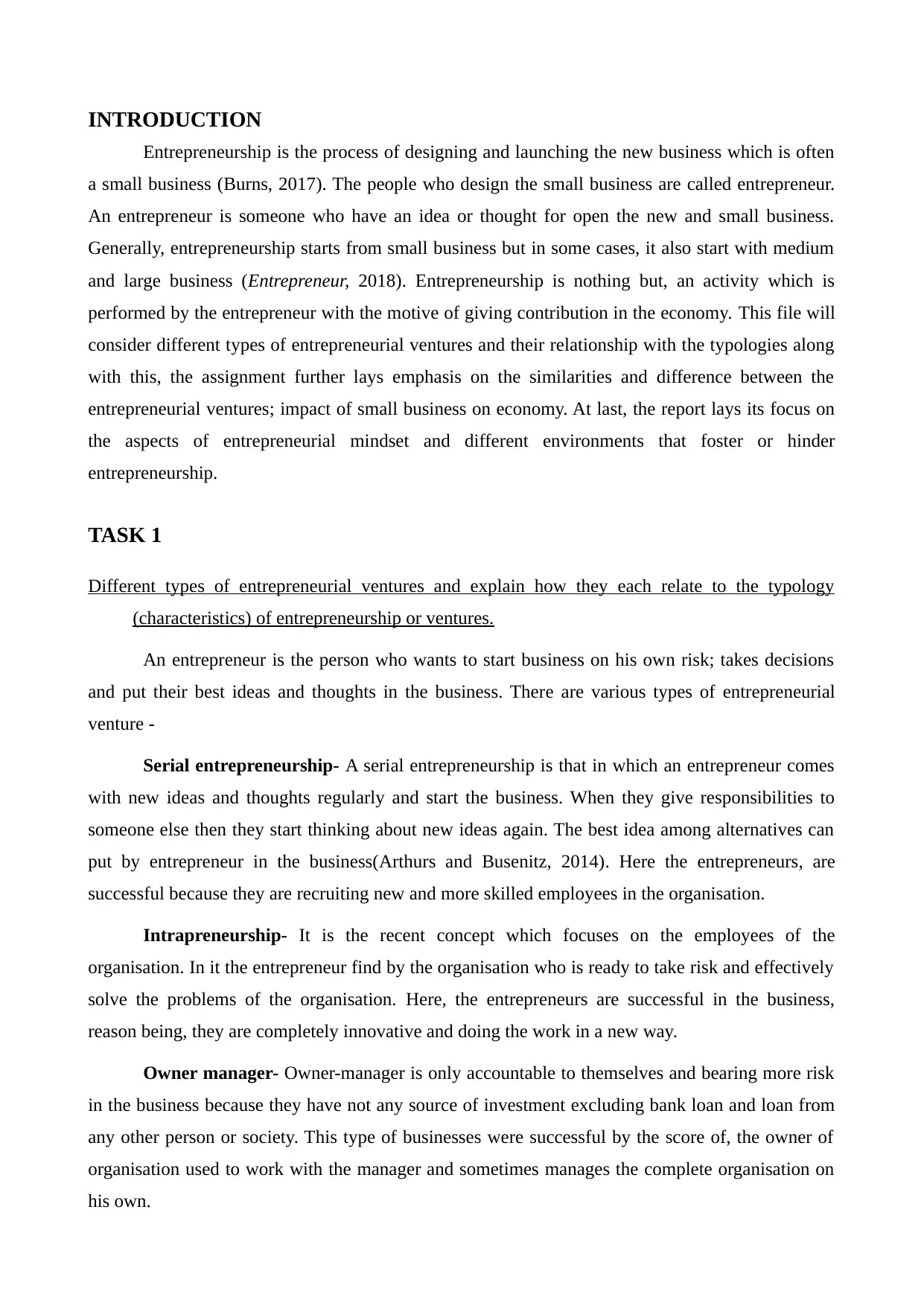
INTRODUCTION
Entrepreneurship is the process of designing and launching the new business which is often
a small business (Burns, 2017). The people who design the small business are called entrepreneur.
An entrepreneur is someone who have an idea or thought for open the new and small business.
Generally, entrepreneurship starts from small business but in some cases, it also start with medium
and large business (Entrepreneur, 2018). Entrepreneurship is nothing but, an activity which is
performed by the entrepreneur with the motive of giving contribution in the economy. This file will
consider different types of entrepreneurial ventures and their relationship with the typologies along
with this, the assignment further lays emphasis on the similarities and difference between the
entrepreneurial ventures; impact of small business on economy. At last, the report lays its focus on
the aspects of entrepreneurial mindset and different environments that foster or hinder
entrepreneurship.
TASK 1
Different types of entrepreneurial ventures and explain how they each relate to the typology
(characteristics) of entrepreneurship or ventures.
An entrepreneur is the person who wants to start business on his own risk; takes decisions
and put their best ideas and thoughts in the business. There are various types of entrepreneurial
venture -
Serial entrepreneurship- A serial entrepreneurship is that in which an entrepreneur comes
with new ideas and thoughts regularly and start the business. When they give responsibilities to
someone else then they start thinking about new ideas again. The best idea among alternatives can
put by entrepreneur in the business(Arthurs and Busenitz, 2014). Here the entrepreneurs, are
successful because they are recruiting new and more skilled employees in the organisation.
Intrapreneurship- It is the recent concept which focuses on the employees of the
organisation. In it the entrepreneur find by the organisation who is ready to take risk and effectively
solve the problems of the organisation. Here, the entrepreneurs are successful in the business,
reason being, they are completely innovative and doing the work in a new way.
Owner manager- Owner-manager is only accountable to themselves and bearing more risk
in the business because they have not any source of investment excluding bank loan and loan from
any other person or society. This type of businesses were successful by the score of, the owner of
organisation used to work with the manager and sometimes manages the complete organisation on
his own.
Entrepreneurship is the process of designing and launching the new business which is often
a small business (Burns, 2017). The people who design the small business are called entrepreneur.
An entrepreneur is someone who have an idea or thought for open the new and small business.
Generally, entrepreneurship starts from small business but in some cases, it also start with medium
and large business (Entrepreneur, 2018). Entrepreneurship is nothing but, an activity which is
performed by the entrepreneur with the motive of giving contribution in the economy. This file will
consider different types of entrepreneurial ventures and their relationship with the typologies along
with this, the assignment further lays emphasis on the similarities and difference between the
entrepreneurial ventures; impact of small business on economy. At last, the report lays its focus on
the aspects of entrepreneurial mindset and different environments that foster or hinder
entrepreneurship.
TASK 1
Different types of entrepreneurial ventures and explain how they each relate to the typology
(characteristics) of entrepreneurship or ventures.
An entrepreneur is the person who wants to start business on his own risk; takes decisions
and put their best ideas and thoughts in the business. There are various types of entrepreneurial
venture -
Serial entrepreneurship- A serial entrepreneurship is that in which an entrepreneur comes
with new ideas and thoughts regularly and start the business. When they give responsibilities to
someone else then they start thinking about new ideas again. The best idea among alternatives can
put by entrepreneur in the business(Arthurs and Busenitz, 2014). Here the entrepreneurs, are
successful because they are recruiting new and more skilled employees in the organisation.
Intrapreneurship- It is the recent concept which focuses on the employees of the
organisation. In it the entrepreneur find by the organisation who is ready to take risk and effectively
solve the problems of the organisation. Here, the entrepreneurs are successful in the business,
reason being, they are completely innovative and doing the work in a new way.
Owner manager- Owner-manager is only accountable to themselves and bearing more risk
in the business because they have not any source of investment excluding bank loan and loan from
any other person or society. This type of businesses were successful by the score of, the owner of
organisation used to work with the manager and sometimes manages the complete organisation on
his own.
⊘ This is a preview!⊘
Do you want full access?
Subscribe today to unlock all pages.

Trusted by 1+ million students worldwide
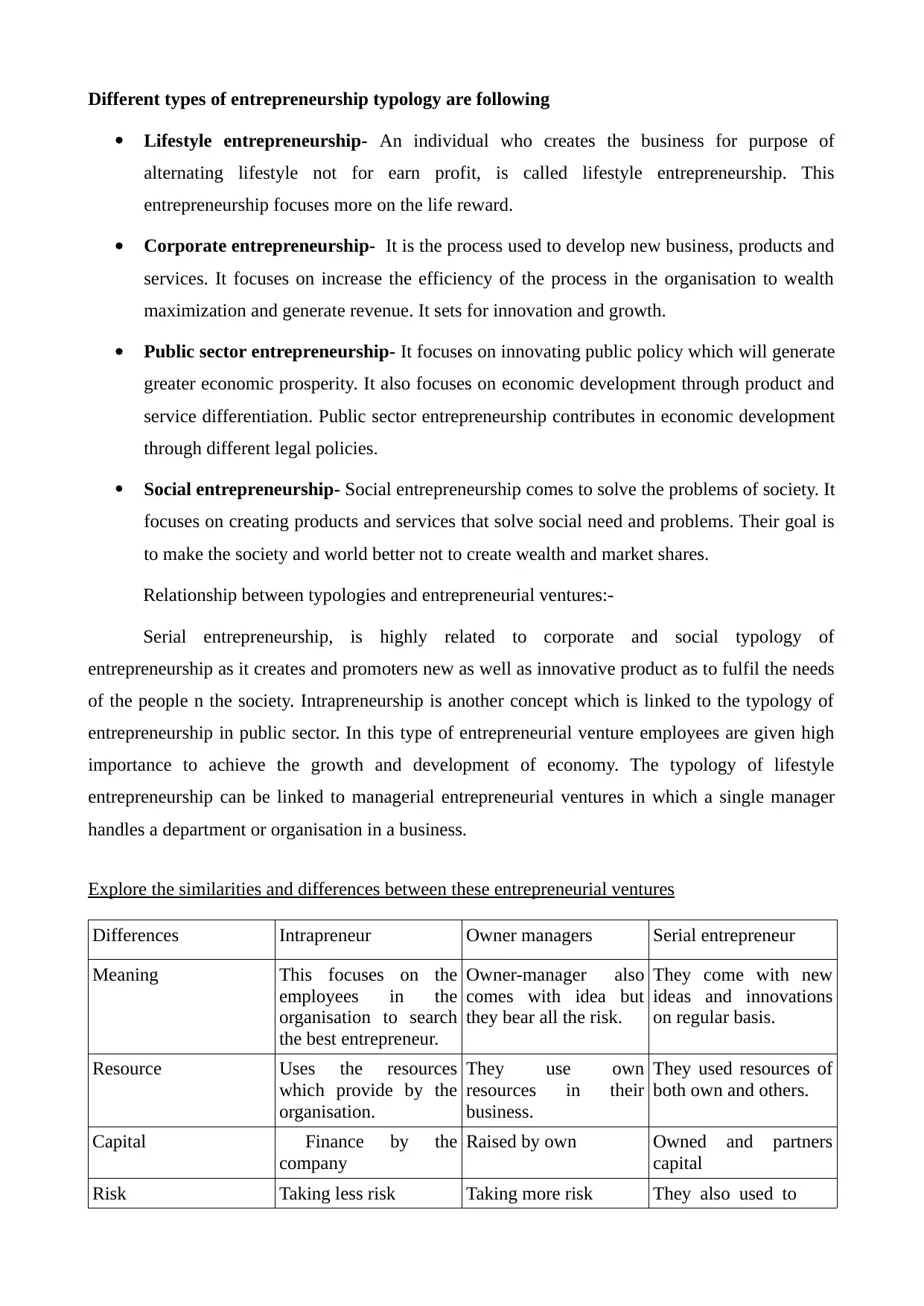
Different types of entrepreneurship typology are following
Lifestyle entrepreneurship- An individual who creates the business for purpose of
alternating lifestyle not for earn profit, is called lifestyle entrepreneurship. This
entrepreneurship focuses more on the life reward.
Corporate entrepreneurship- It is the process used to develop new business, products and
services. It focuses on increase the efficiency of the process in the organisation to wealth
maximization and generate revenue. It sets for innovation and growth.
Public sector entrepreneurship- It focuses on innovating public policy which will generate
greater economic prosperity. It also focuses on economic development through product and
service differentiation. Public sector entrepreneurship contributes in economic development
through different legal policies.
Social entrepreneurship- Social entrepreneurship comes to solve the problems of society. It
focuses on creating products and services that solve social need and problems. Their goal is
to make the society and world better not to create wealth and market shares.
Relationship between typologies and entrepreneurial ventures:-
Serial entrepreneurship, is highly related to corporate and social typology of
entrepreneurship as it creates and promoters new as well as innovative product as to fulfil the needs
of the people n the society. Intrapreneurship is another concept which is linked to the typology of
entrepreneurship in public sector. In this type of entrepreneurial venture employees are given high
importance to achieve the growth and development of economy. The typology of lifestyle
entrepreneurship can be linked to managerial entrepreneurial ventures in which a single manager
handles a department or organisation in a business.
Explore the similarities and differences between these entrepreneurial ventures
Differences Intrapreneur Owner managers Serial entrepreneur
Meaning This focuses on the
employees in the
organisation to search
the best entrepreneur.
Owner-manager also
comes with idea but
they bear all the risk.
They come with new
ideas and innovations
on regular basis.
Resource Uses the resources
which provide by the
organisation.
They use own
resources in their
business.
They used resources of
both own and others.
Capital Finance by the
company
Raised by own Owned and partners
capital
Risk Taking less risk Taking more risk They also used to
Lifestyle entrepreneurship- An individual who creates the business for purpose of
alternating lifestyle not for earn profit, is called lifestyle entrepreneurship. This
entrepreneurship focuses more on the life reward.
Corporate entrepreneurship- It is the process used to develop new business, products and
services. It focuses on increase the efficiency of the process in the organisation to wealth
maximization and generate revenue. It sets for innovation and growth.
Public sector entrepreneurship- It focuses on innovating public policy which will generate
greater economic prosperity. It also focuses on economic development through product and
service differentiation. Public sector entrepreneurship contributes in economic development
through different legal policies.
Social entrepreneurship- Social entrepreneurship comes to solve the problems of society. It
focuses on creating products and services that solve social need and problems. Their goal is
to make the society and world better not to create wealth and market shares.
Relationship between typologies and entrepreneurial ventures:-
Serial entrepreneurship, is highly related to corporate and social typology of
entrepreneurship as it creates and promoters new as well as innovative product as to fulfil the needs
of the people n the society. Intrapreneurship is another concept which is linked to the typology of
entrepreneurship in public sector. In this type of entrepreneurial venture employees are given high
importance to achieve the growth and development of economy. The typology of lifestyle
entrepreneurship can be linked to managerial entrepreneurial ventures in which a single manager
handles a department or organisation in a business.
Explore the similarities and differences between these entrepreneurial ventures
Differences Intrapreneur Owner managers Serial entrepreneur
Meaning This focuses on the
employees in the
organisation to search
the best entrepreneur.
Owner-manager also
comes with idea but
they bear all the risk.
They come with new
ideas and innovations
on regular basis.
Resource Uses the resources
which provide by the
organisation.
They use own
resources in their
business.
They used resources of
both own and others.
Capital Finance by the
company
Raised by own Owned and partners
capital
Risk Taking less risk Taking more risk They also used to
Paraphrase This Document
Need a fresh take? Get an instant paraphrase of this document with our AI Paraphraser
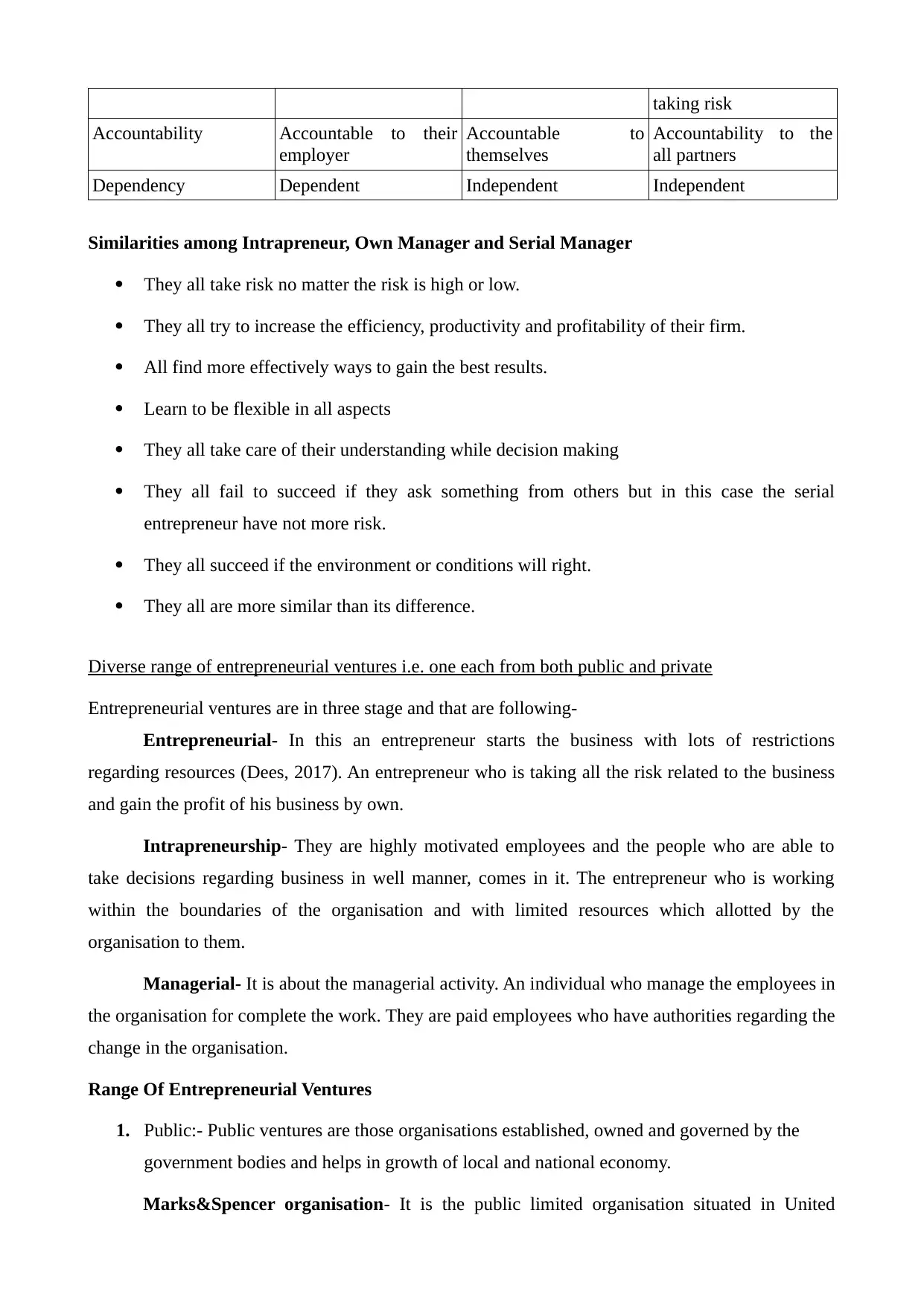
taking risk
Accountability Accountable to their
employer
Accountable to
themselves
Accountability to the
all partners
Dependency Dependent Independent Independent
Similarities among Intrapreneur, Own Manager and Serial Manager
They all take risk no matter the risk is high or low.
They all try to increase the efficiency, productivity and profitability of their firm.
All find more effectively ways to gain the best results.
Learn to be flexible in all aspects
They all take care of their understanding while decision making
They all fail to succeed if they ask something from others but in this case the serial
entrepreneur have not more risk.
They all succeed if the environment or conditions will right.
They all are more similar than its difference.
Diverse range of entrepreneurial ventures i.e. one each from both public and private
Entrepreneurial ventures are in three stage and that are following-
Entrepreneurial- In this an entrepreneur starts the business with lots of restrictions
regarding resources (Dees, 2017). An entrepreneur who is taking all the risk related to the business
and gain the profit of his business by own.
Intrapreneurship- They are highly motivated employees and the people who are able to
take decisions regarding business in well manner, comes in it. The entrepreneur who is working
within the boundaries of the organisation and with limited resources which allotted by the
organisation to them.
Managerial- It is about the managerial activity. An individual who manage the employees in
the organisation for complete the work. They are paid employees who have authorities regarding the
change in the organisation.
Range Of Entrepreneurial Ventures
1. Public:- Public ventures are those organisations established, owned and governed by the
government bodies and helps in growth of local and national economy.
Marks&Spencer organisation- It is the public limited organisation situated in United
Accountability Accountable to their
employer
Accountable to
themselves
Accountability to the
all partners
Dependency Dependent Independent Independent
Similarities among Intrapreneur, Own Manager and Serial Manager
They all take risk no matter the risk is high or low.
They all try to increase the efficiency, productivity and profitability of their firm.
All find more effectively ways to gain the best results.
Learn to be flexible in all aspects
They all take care of their understanding while decision making
They all fail to succeed if they ask something from others but in this case the serial
entrepreneur have not more risk.
They all succeed if the environment or conditions will right.
They all are more similar than its difference.
Diverse range of entrepreneurial ventures i.e. one each from both public and private
Entrepreneurial ventures are in three stage and that are following-
Entrepreneurial- In this an entrepreneur starts the business with lots of restrictions
regarding resources (Dees, 2017). An entrepreneur who is taking all the risk related to the business
and gain the profit of his business by own.
Intrapreneurship- They are highly motivated employees and the people who are able to
take decisions regarding business in well manner, comes in it. The entrepreneur who is working
within the boundaries of the organisation and with limited resources which allotted by the
organisation to them.
Managerial- It is about the managerial activity. An individual who manage the employees in
the organisation for complete the work. They are paid employees who have authorities regarding the
change in the organisation.
Range Of Entrepreneurial Ventures
1. Public:- Public ventures are those organisations established, owned and governed by the
government bodies and helps in growth of local and national economy.
Marks&Spencer organisation- It is the public limited organisation situated in United
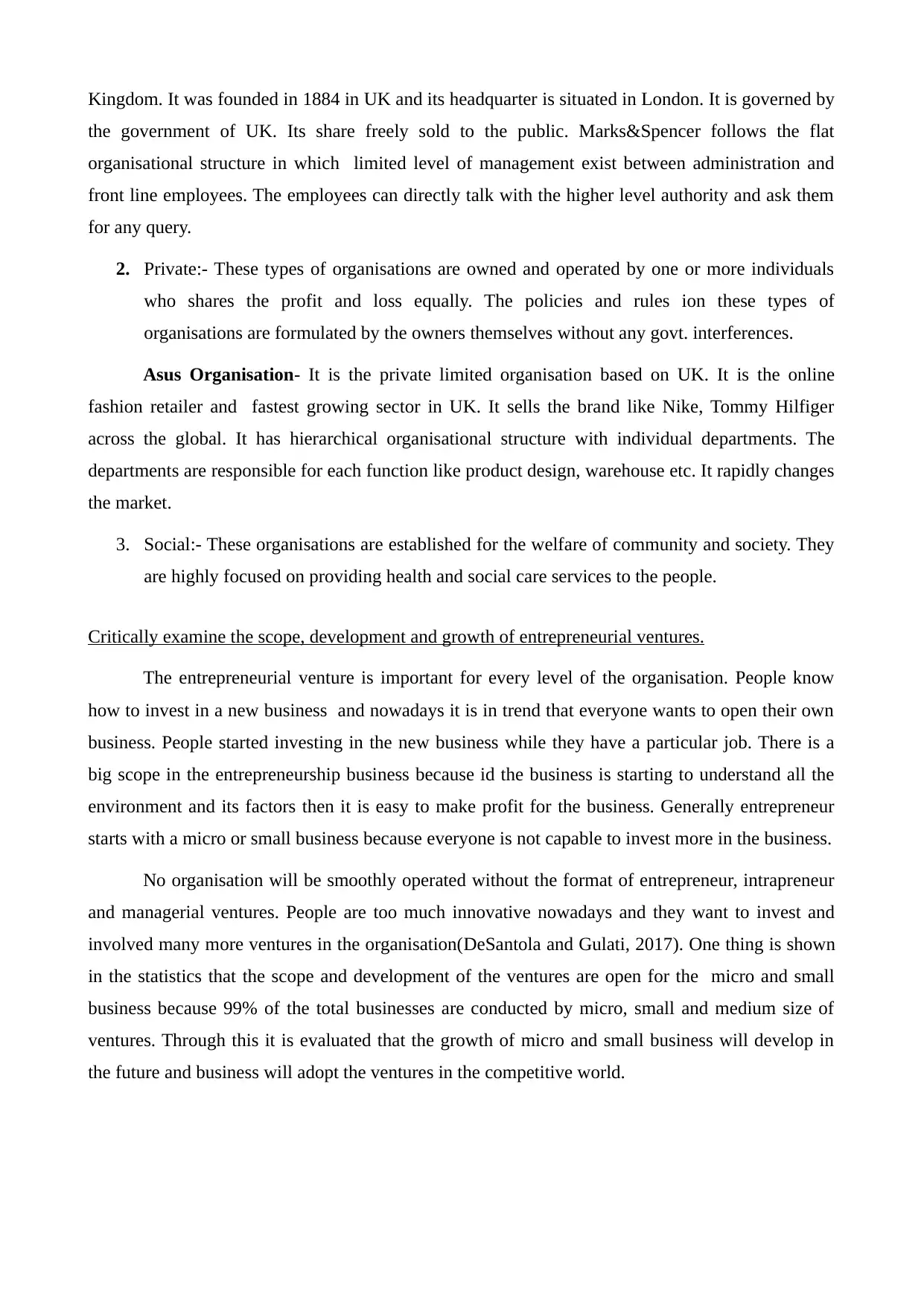
Kingdom. It was founded in 1884 in UK and its headquarter is situated in London. It is governed by
the government of UK. Its share freely sold to the public. Marks&Spencer follows the flat
organisational structure in which limited level of management exist between administration and
front line employees. The employees can directly talk with the higher level authority and ask them
for any query.
2. Private:- These types of organisations are owned and operated by one or more individuals
who shares the profit and loss equally. The policies and rules ion these types of
organisations are formulated by the owners themselves without any govt. interferences.
Asus Organisation- It is the private limited organisation based on UK. It is the online
fashion retailer and fastest growing sector in UK. It sells the brand like Nike, Tommy Hilfiger
across the global. It has hierarchical organisational structure with individual departments. The
departments are responsible for each function like product design, warehouse etc. It rapidly changes
the market.
3. Social:- These organisations are established for the welfare of community and society. They
are highly focused on providing health and social care services to the people.
Critically examine the scope, development and growth of entrepreneurial ventures.
The entrepreneurial venture is important for every level of the organisation. People know
how to invest in a new business and nowadays it is in trend that everyone wants to open their own
business. People started investing in the new business while they have a particular job. There is a
big scope in the entrepreneurship business because id the business is starting to understand all the
environment and its factors then it is easy to make profit for the business. Generally entrepreneur
starts with a micro or small business because everyone is not capable to invest more in the business.
No organisation will be smoothly operated without the format of entrepreneur, intrapreneur
and managerial ventures. People are too much innovative nowadays and they want to invest and
involved many more ventures in the organisation(DeSantola and Gulati, 2017). One thing is shown
in the statistics that the scope and development of the ventures are open for the micro and small
business because 99% of the total businesses are conducted by micro, small and medium size of
ventures. Through this it is evaluated that the growth of micro and small business will develop in
the future and business will adopt the ventures in the competitive world.
the government of UK. Its share freely sold to the public. Marks&Spencer follows the flat
organisational structure in which limited level of management exist between administration and
front line employees. The employees can directly talk with the higher level authority and ask them
for any query.
2. Private:- These types of organisations are owned and operated by one or more individuals
who shares the profit and loss equally. The policies and rules ion these types of
organisations are formulated by the owners themselves without any govt. interferences.
Asus Organisation- It is the private limited organisation based on UK. It is the online
fashion retailer and fastest growing sector in UK. It sells the brand like Nike, Tommy Hilfiger
across the global. It has hierarchical organisational structure with individual departments. The
departments are responsible for each function like product design, warehouse etc. It rapidly changes
the market.
3. Social:- These organisations are established for the welfare of community and society. They
are highly focused on providing health and social care services to the people.
Critically examine the scope, development and growth of entrepreneurial ventures.
The entrepreneurial venture is important for every level of the organisation. People know
how to invest in a new business and nowadays it is in trend that everyone wants to open their own
business. People started investing in the new business while they have a particular job. There is a
big scope in the entrepreneurship business because id the business is starting to understand all the
environment and its factors then it is easy to make profit for the business. Generally entrepreneur
starts with a micro or small business because everyone is not capable to invest more in the business.
No organisation will be smoothly operated without the format of entrepreneur, intrapreneur
and managerial ventures. People are too much innovative nowadays and they want to invest and
involved many more ventures in the organisation(DeSantola and Gulati, 2017). One thing is shown
in the statistics that the scope and development of the ventures are open for the micro and small
business because 99% of the total businesses are conducted by micro, small and medium size of
ventures. Through this it is evaluated that the growth of micro and small business will develop in
the future and business will adopt the ventures in the competitive world.
⊘ This is a preview!⊘
Do you want full access?
Subscribe today to unlock all pages.

Trusted by 1+ million students worldwide
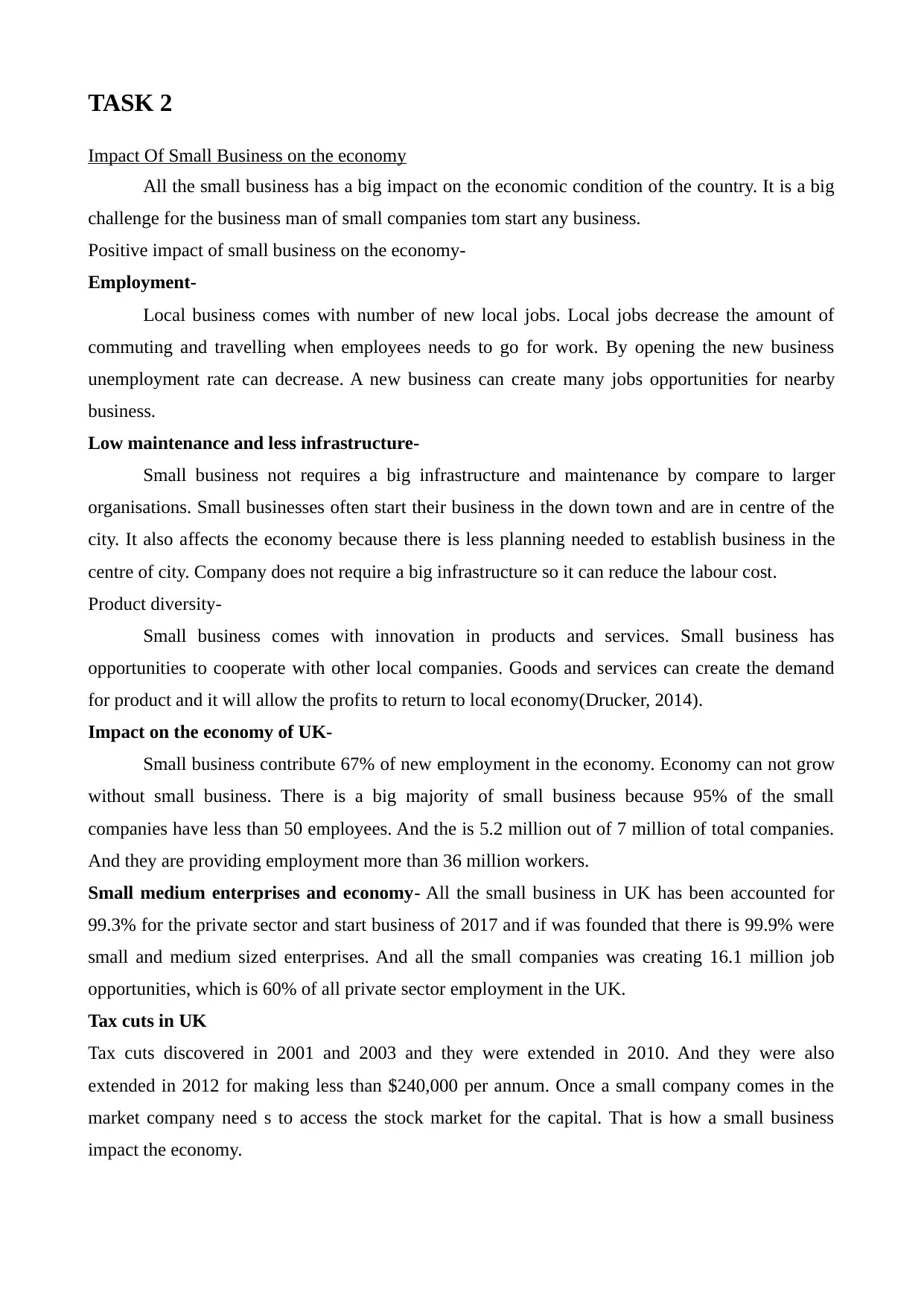
TASK 2
Impact Of Small Business on the economy
All the small business has a big impact on the economic condition of the country. It is a big
challenge for the business man of small companies tom start any business.
Positive impact of small business on the economy-
Employment-
Local business comes with number of new local jobs. Local jobs decrease the amount of
commuting and travelling when employees needs to go for work. By opening the new business
unemployment rate can decrease. A new business can create many jobs opportunities for nearby
business.
Low maintenance and less infrastructure-
Small business not requires a big infrastructure and maintenance by compare to larger
organisations. Small businesses often start their business in the down town and are in centre of the
city. It also affects the economy because there is less planning needed to establish business in the
centre of city. Company does not require a big infrastructure so it can reduce the labour cost.
Product diversity-
Small business comes with innovation in products and services. Small business has
opportunities to cooperate with other local companies. Goods and services can create the demand
for product and it will allow the profits to return to local economy(Drucker, 2014).
Impact on the economy of UK-
Small business contribute 67% of new employment in the economy. Economy can not grow
without small business. There is a big majority of small business because 95% of the small
companies have less than 50 employees. And the is 5.2 million out of 7 million of total companies.
And they are providing employment more than 36 million workers.
Small medium enterprises and economy- All the small business in UK has been accounted for
99.3% for the private sector and start business of 2017 and if was founded that there is 99.9% were
small and medium sized enterprises. And all the small companies was creating 16.1 million job
opportunities, which is 60% of all private sector employment in the UK.
Tax cuts in UK
Tax cuts discovered in 2001 and 2003 and they were extended in 2010. And they were also
extended in 2012 for making less than $240,000 per annum. Once a small company comes in the
market company need s to access the stock market for the capital. That is how a small business
impact the economy.
Impact Of Small Business on the economy
All the small business has a big impact on the economic condition of the country. It is a big
challenge for the business man of small companies tom start any business.
Positive impact of small business on the economy-
Employment-
Local business comes with number of new local jobs. Local jobs decrease the amount of
commuting and travelling when employees needs to go for work. By opening the new business
unemployment rate can decrease. A new business can create many jobs opportunities for nearby
business.
Low maintenance and less infrastructure-
Small business not requires a big infrastructure and maintenance by compare to larger
organisations. Small businesses often start their business in the down town and are in centre of the
city. It also affects the economy because there is less planning needed to establish business in the
centre of city. Company does not require a big infrastructure so it can reduce the labour cost.
Product diversity-
Small business comes with innovation in products and services. Small business has
opportunities to cooperate with other local companies. Goods and services can create the demand
for product and it will allow the profits to return to local economy(Drucker, 2014).
Impact on the economy of UK-
Small business contribute 67% of new employment in the economy. Economy can not grow
without small business. There is a big majority of small business because 95% of the small
companies have less than 50 employees. And the is 5.2 million out of 7 million of total companies.
And they are providing employment more than 36 million workers.
Small medium enterprises and economy- All the small business in UK has been accounted for
99.3% for the private sector and start business of 2017 and if was founded that there is 99.9% were
small and medium sized enterprises. And all the small companies was creating 16.1 million job
opportunities, which is 60% of all private sector employment in the UK.
Tax cuts in UK
Tax cuts discovered in 2001 and 2003 and they were extended in 2010. And they were also
extended in 2012 for making less than $240,000 per annum. Once a small company comes in the
market company need s to access the stock market for the capital. That is how a small business
impact the economy.
Paraphrase This Document
Need a fresh take? Get an instant paraphrase of this document with our AI Paraphraser
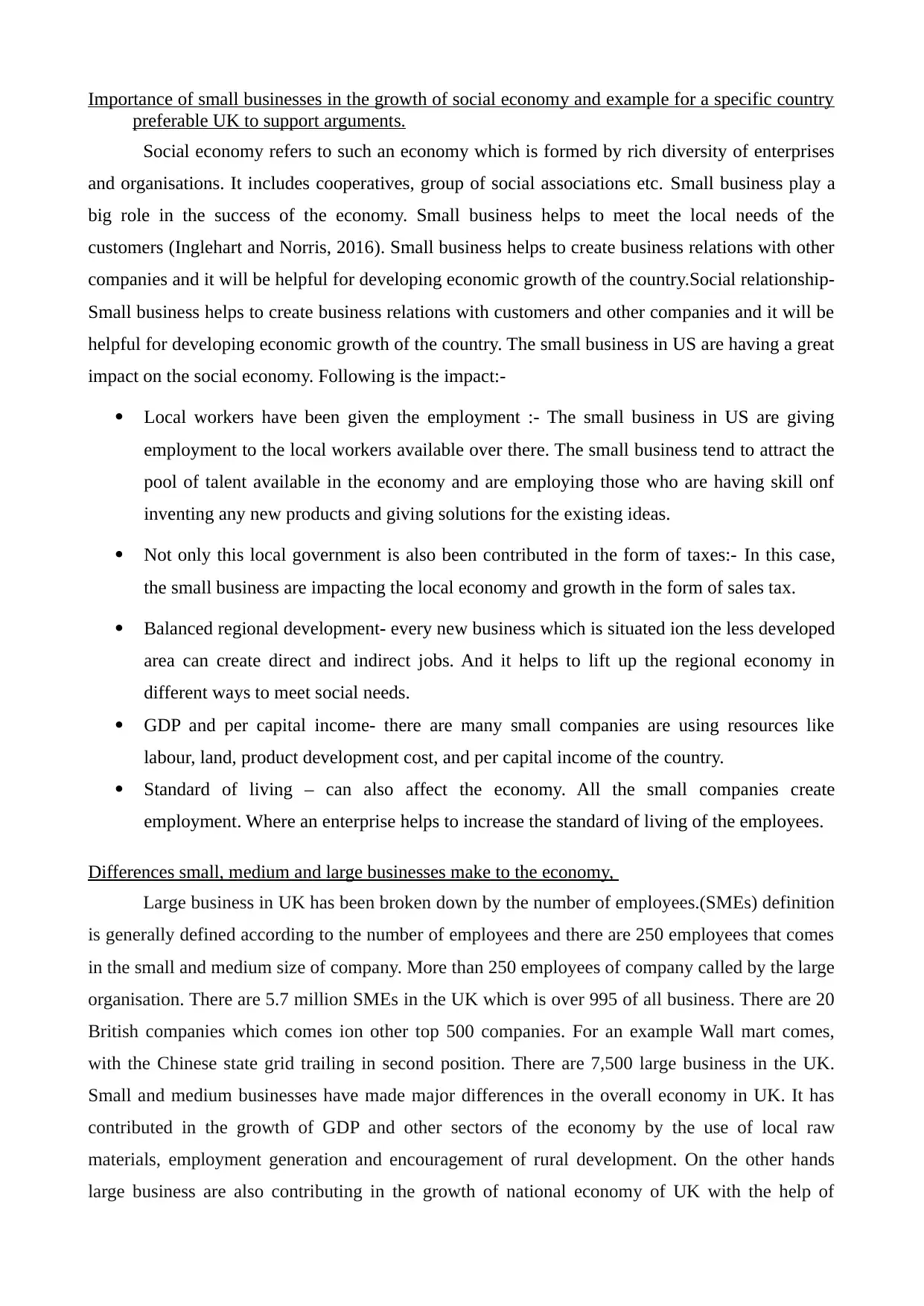
Importance of small businesses in the growth of social economy and example for a specific country
preferable UK to support arguments.
Social economy refers to such an economy which is formed by rich diversity of enterprises
and organisations. It includes cooperatives, group of social associations etc. Small business play a
big role in the success of the economy. Small business helps to meet the local needs of the
customers (Inglehart and Norris, 2016). Small business helps to create business relations with other
companies and it will be helpful for developing economic growth of the country.Social relationship-
Small business helps to create business relations with customers and other companies and it will be
helpful for developing economic growth of the country. The small business in US are having a great
impact on the social economy. Following is the impact:-
Local workers have been given the employment :- The small business in US are giving
employment to the local workers available over there. The small business tend to attract the
pool of talent available in the economy and are employing those who are having skill onf
inventing any new products and giving solutions for the existing ideas.
Not only this local government is also been contributed in the form of taxes:- In this case,
the small business are impacting the local economy and growth in the form of sales tax.
Balanced regional development- every new business which is situated ion the less developed
area can create direct and indirect jobs. And it helps to lift up the regional economy in
different ways to meet social needs.
GDP and per capital income- there are many small companies are using resources like
labour, land, product development cost, and per capital income of the country.
Standard of living – can also affect the economy. All the small companies create
employment. Where an enterprise helps to increase the standard of living of the employees.
Differences small, medium and large businesses make to the economy,
Large business in UK has been broken down by the number of employees.(SMEs) definition
is generally defined according to the number of employees and there are 250 employees that comes
in the small and medium size of company. More than 250 employees of company called by the large
organisation. There are 5.7 million SMEs in the UK which is over 995 of all business. There are 20
British companies which comes ion other top 500 companies. For an example Wall mart comes,
with the Chinese state grid trailing in second position. There are 7,500 large business in the UK.
Small and medium businesses have made major differences in the overall economy in UK. It has
contributed in the growth of GDP and other sectors of the economy by the use of local raw
materials, employment generation and encouragement of rural development. On the other hands
large business are also contributing in the growth of national economy of UK with the help of
preferable UK to support arguments.
Social economy refers to such an economy which is formed by rich diversity of enterprises
and organisations. It includes cooperatives, group of social associations etc. Small business play a
big role in the success of the economy. Small business helps to meet the local needs of the
customers (Inglehart and Norris, 2016). Small business helps to create business relations with other
companies and it will be helpful for developing economic growth of the country.Social relationship-
Small business helps to create business relations with customers and other companies and it will be
helpful for developing economic growth of the country. The small business in US are having a great
impact on the social economy. Following is the impact:-
Local workers have been given the employment :- The small business in US are giving
employment to the local workers available over there. The small business tend to attract the
pool of talent available in the economy and are employing those who are having skill onf
inventing any new products and giving solutions for the existing ideas.
Not only this local government is also been contributed in the form of taxes:- In this case,
the small business are impacting the local economy and growth in the form of sales tax.
Balanced regional development- every new business which is situated ion the less developed
area can create direct and indirect jobs. And it helps to lift up the regional economy in
different ways to meet social needs.
GDP and per capital income- there are many small companies are using resources like
labour, land, product development cost, and per capital income of the country.
Standard of living – can also affect the economy. All the small companies create
employment. Where an enterprise helps to increase the standard of living of the employees.
Differences small, medium and large businesses make to the economy,
Large business in UK has been broken down by the number of employees.(SMEs) definition
is generally defined according to the number of employees and there are 250 employees that comes
in the small and medium size of company. More than 250 employees of company called by the large
organisation. There are 5.7 million SMEs in the UK which is over 995 of all business. There are 20
British companies which comes ion other top 500 companies. For an example Wall mart comes,
with the Chinese state grid trailing in second position. There are 7,500 large business in the UK.
Small and medium businesses have made major differences in the overall economy in UK. It has
contributed in the growth of GDP and other sectors of the economy by the use of local raw
materials, employment generation and encouragement of rural development. On the other hands
large business are also contributing in the growth of national economy of UK with the help of
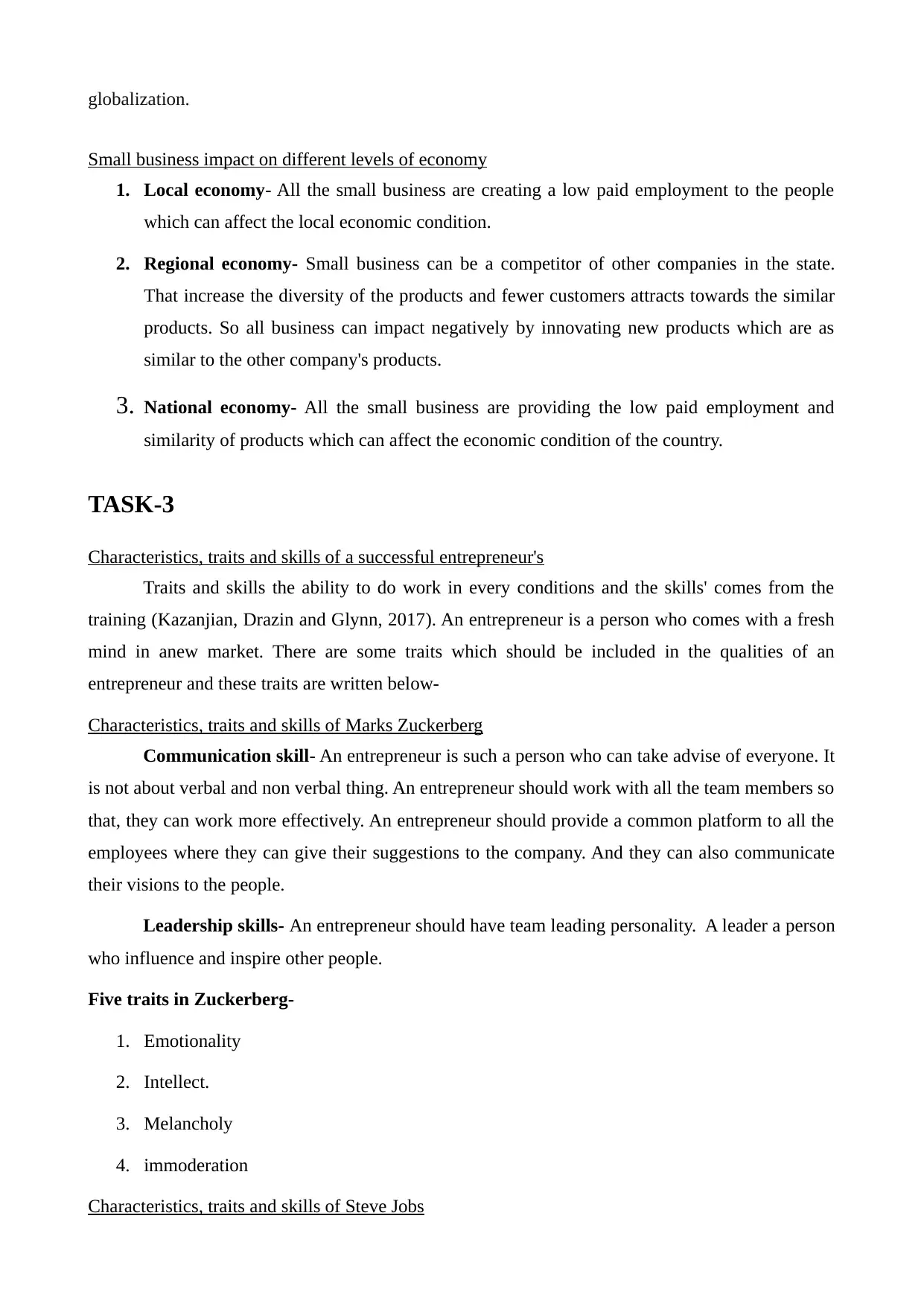
globalization.
Small business impact on different levels of economy
1. Local economy- All the small business are creating a low paid employment to the people
which can affect the local economic condition.
2. Regional economy- Small business can be a competitor of other companies in the state.
That increase the diversity of the products and fewer customers attracts towards the similar
products. So all business can impact negatively by innovating new products which are as
similar to the other company's products.
3. National economy- All the small business are providing the low paid employment and
similarity of products which can affect the economic condition of the country.
TASK-3
Characteristics, traits and skills of a successful entrepreneur's
Traits and skills the ability to do work in every conditions and the skills' comes from the
training (Kazanjian, Drazin and Glynn, 2017). An entrepreneur is a person who comes with a fresh
mind in anew market. There are some traits which should be included in the qualities of an
entrepreneur and these traits are written below-
Characteristics, traits and skills of Marks Zuckerberg
Communication skill- An entrepreneur is such a person who can take advise of everyone. It
is not about verbal and non verbal thing. An entrepreneur should work with all the team members so
that, they can work more effectively. An entrepreneur should provide a common platform to all the
employees where they can give their suggestions to the company. And they can also communicate
their visions to the people.
Leadership skills- An entrepreneur should have team leading personality. A leader a person
who influence and inspire other people.
Five traits in Zuckerberg-
1. Emotionality
2. Intellect.
3. Melancholy
4. immoderation
Characteristics, traits and skills of Steve Jobs
Small business impact on different levels of economy
1. Local economy- All the small business are creating a low paid employment to the people
which can affect the local economic condition.
2. Regional economy- Small business can be a competitor of other companies in the state.
That increase the diversity of the products and fewer customers attracts towards the similar
products. So all business can impact negatively by innovating new products which are as
similar to the other company's products.
3. National economy- All the small business are providing the low paid employment and
similarity of products which can affect the economic condition of the country.
TASK-3
Characteristics, traits and skills of a successful entrepreneur's
Traits and skills the ability to do work in every conditions and the skills' comes from the
training (Kazanjian, Drazin and Glynn, 2017). An entrepreneur is a person who comes with a fresh
mind in anew market. There are some traits which should be included in the qualities of an
entrepreneur and these traits are written below-
Characteristics, traits and skills of Marks Zuckerberg
Communication skill- An entrepreneur is such a person who can take advise of everyone. It
is not about verbal and non verbal thing. An entrepreneur should work with all the team members so
that, they can work more effectively. An entrepreneur should provide a common platform to all the
employees where they can give their suggestions to the company. And they can also communicate
their visions to the people.
Leadership skills- An entrepreneur should have team leading personality. A leader a person
who influence and inspire other people.
Five traits in Zuckerberg-
1. Emotionality
2. Intellect.
3. Melancholy
4. immoderation
Characteristics, traits and skills of Steve Jobs
⊘ This is a preview!⊘
Do you want full access?
Subscribe today to unlock all pages.

Trusted by 1+ million students worldwide
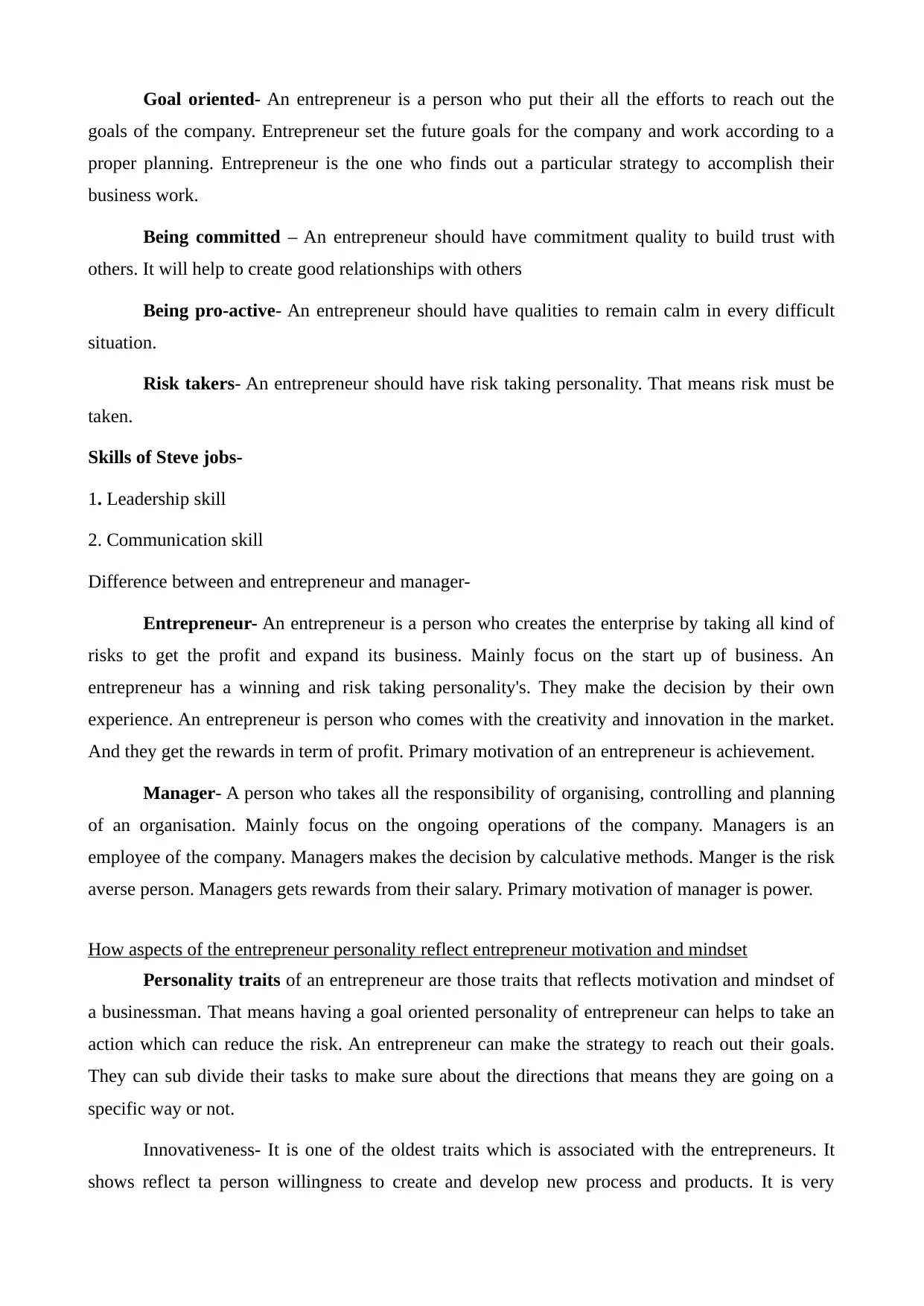
Goal oriented- An entrepreneur is a person who put their all the efforts to reach out the
goals of the company. Entrepreneur set the future goals for the company and work according to a
proper planning. Entrepreneur is the one who finds out a particular strategy to accomplish their
business work.
Being committed – An entrepreneur should have commitment quality to build trust with
others. It will help to create good relationships with others
Being pro-active- An entrepreneur should have qualities to remain calm in every difficult
situation.
Risk takers- An entrepreneur should have risk taking personality. That means risk must be
taken.
Skills of Steve jobs-
1. Leadership skill
2. Communication skill
Difference between and entrepreneur and manager-
Entrepreneur- An entrepreneur is a person who creates the enterprise by taking all kind of
risks to get the profit and expand its business. Mainly focus on the start up of business. An
entrepreneur has a winning and risk taking personality's. They make the decision by their own
experience. An entrepreneur is person who comes with the creativity and innovation in the market.
And they get the rewards in term of profit. Primary motivation of an entrepreneur is achievement.
Manager- A person who takes all the responsibility of organising, controlling and planning
of an organisation. Mainly focus on the ongoing operations of the company. Managers is an
employee of the company. Managers makes the decision by calculative methods. Manger is the risk
averse person. Managers gets rewards from their salary. Primary motivation of manager is power.
How aspects of the entrepreneur personality reflect entrepreneur motivation and mindset
Personality traits of an entrepreneur are those traits that reflects motivation and mindset of
a businessman. That means having a goal oriented personality of entrepreneur can helps to take an
action which can reduce the risk. An entrepreneur can make the strategy to reach out their goals.
They can sub divide their tasks to make sure about the directions that means they are going on a
specific way or not.
Innovativeness- It is one of the oldest traits which is associated with the entrepreneurs. It
shows reflect ta person willingness to create and develop new process and products. It is very
goals of the company. Entrepreneur set the future goals for the company and work according to a
proper planning. Entrepreneur is the one who finds out a particular strategy to accomplish their
business work.
Being committed – An entrepreneur should have commitment quality to build trust with
others. It will help to create good relationships with others
Being pro-active- An entrepreneur should have qualities to remain calm in every difficult
situation.
Risk takers- An entrepreneur should have risk taking personality. That means risk must be
taken.
Skills of Steve jobs-
1. Leadership skill
2. Communication skill
Difference between and entrepreneur and manager-
Entrepreneur- An entrepreneur is a person who creates the enterprise by taking all kind of
risks to get the profit and expand its business. Mainly focus on the start up of business. An
entrepreneur has a winning and risk taking personality's. They make the decision by their own
experience. An entrepreneur is person who comes with the creativity and innovation in the market.
And they get the rewards in term of profit. Primary motivation of an entrepreneur is achievement.
Manager- A person who takes all the responsibility of organising, controlling and planning
of an organisation. Mainly focus on the ongoing operations of the company. Managers is an
employee of the company. Managers makes the decision by calculative methods. Manger is the risk
averse person. Managers gets rewards from their salary. Primary motivation of manager is power.
How aspects of the entrepreneur personality reflect entrepreneur motivation and mindset
Personality traits of an entrepreneur are those traits that reflects motivation and mindset of
a businessman. That means having a goal oriented personality of entrepreneur can helps to take an
action which can reduce the risk. An entrepreneur can make the strategy to reach out their goals.
They can sub divide their tasks to make sure about the directions that means they are going on a
specific way or not.
Innovativeness- It is one of the oldest traits which is associated with the entrepreneurs. It
shows reflect ta person willingness to create and develop new process and products. It is very
Paraphrase This Document
Need a fresh take? Get an instant paraphrase of this document with our AI Paraphraser
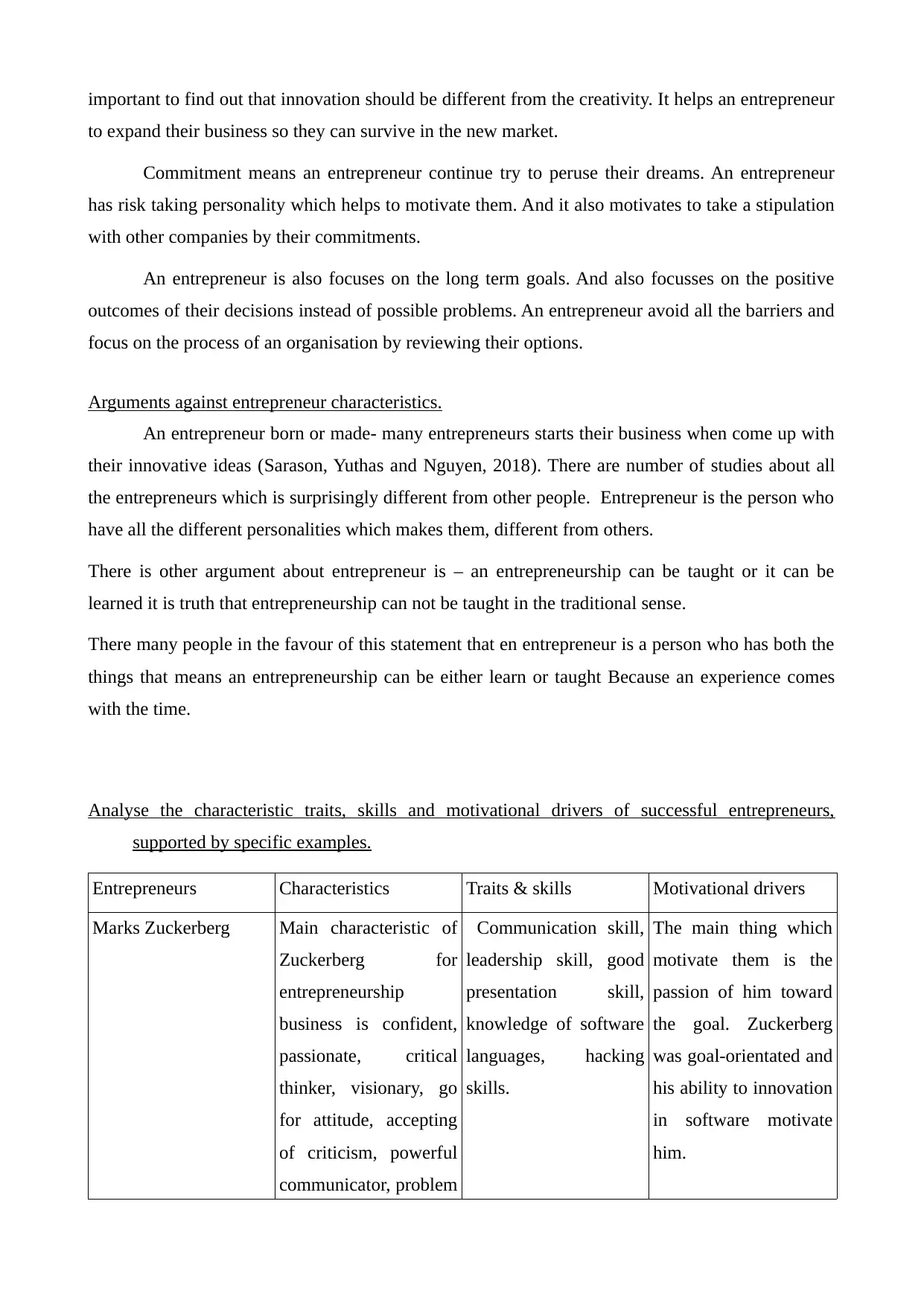
important to find out that innovation should be different from the creativity. It helps an entrepreneur
to expand their business so they can survive in the new market.
Commitment means an entrepreneur continue try to peruse their dreams. An entrepreneur
has risk taking personality which helps to motivate them. And it also motivates to take a stipulation
with other companies by their commitments.
An entrepreneur is also focuses on the long term goals. And also focusses on the positive
outcomes of their decisions instead of possible problems. An entrepreneur avoid all the barriers and
focus on the process of an organisation by reviewing their options.
Arguments against entrepreneur characteristics.
An entrepreneur born or made- many entrepreneurs starts their business when come up with
their innovative ideas (Sarason, Yuthas and Nguyen, 2018). There are number of studies about all
the entrepreneurs which is surprisingly different from other people. Entrepreneur is the person who
have all the different personalities which makes them, different from others.
There is other argument about entrepreneur is – an entrepreneurship can be taught or it can be
learned it is truth that entrepreneurship can not be taught in the traditional sense.
There many people in the favour of this statement that en entrepreneur is a person who has both the
things that means an entrepreneurship can be either learn or taught Because an experience comes
with the time.
Analyse the characteristic traits, skills and motivational drivers of successful entrepreneurs,
supported by specific examples.
Entrepreneurs Characteristics Traits & skills Motivational drivers
Marks Zuckerberg Main characteristic of
Zuckerberg for
entrepreneurship
business is confident,
passionate, critical
thinker, visionary, go
for attitude, accepting
of criticism, powerful
communicator, problem
Communication skill,
leadership skill, good
presentation skill,
knowledge of software
languages, hacking
skills.
The main thing which
motivate them is the
passion of him toward
the goal. Zuckerberg
was goal-orientated and
his ability to innovation
in software motivate
him.
to expand their business so they can survive in the new market.
Commitment means an entrepreneur continue try to peruse their dreams. An entrepreneur
has risk taking personality which helps to motivate them. And it also motivates to take a stipulation
with other companies by their commitments.
An entrepreneur is also focuses on the long term goals. And also focusses on the positive
outcomes of their decisions instead of possible problems. An entrepreneur avoid all the barriers and
focus on the process of an organisation by reviewing their options.
Arguments against entrepreneur characteristics.
An entrepreneur born or made- many entrepreneurs starts their business when come up with
their innovative ideas (Sarason, Yuthas and Nguyen, 2018). There are number of studies about all
the entrepreneurs which is surprisingly different from other people. Entrepreneur is the person who
have all the different personalities which makes them, different from others.
There is other argument about entrepreneur is – an entrepreneurship can be taught or it can be
learned it is truth that entrepreneurship can not be taught in the traditional sense.
There many people in the favour of this statement that en entrepreneur is a person who has both the
things that means an entrepreneurship can be either learn or taught Because an experience comes
with the time.
Analyse the characteristic traits, skills and motivational drivers of successful entrepreneurs,
supported by specific examples.
Entrepreneurs Characteristics Traits & skills Motivational drivers
Marks Zuckerberg Main characteristic of
Zuckerberg for
entrepreneurship
business is confident,
passionate, critical
thinker, visionary, go
for attitude, accepting
of criticism, powerful
communicator, problem
Communication skill,
leadership skill, good
presentation skill,
knowledge of software
languages, hacking
skills.
The main thing which
motivate them is the
passion of him toward
the goal. Zuckerberg
was goal-orientated and
his ability to innovation
in software motivate
him.
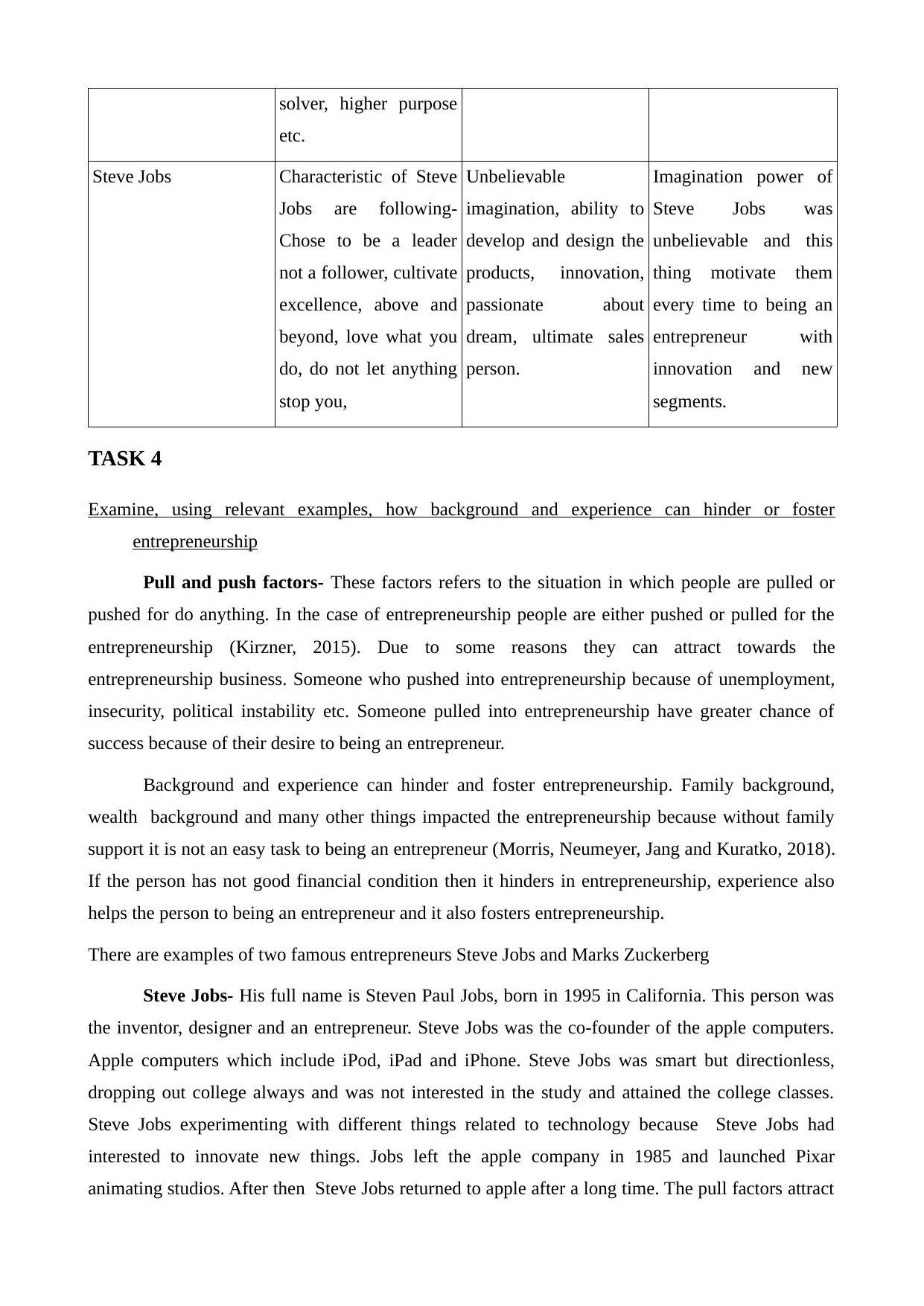
solver, higher purpose
etc.
Steve Jobs Characteristic of Steve
Jobs are following-
Chose to be a leader
not a follower, cultivate
excellence, above and
beyond, love what you
do, do not let anything
stop you,
Unbelievable
imagination, ability to
develop and design the
products, innovation,
passionate about
dream, ultimate sales
person.
Imagination power of
Steve Jobs was
unbelievable and this
thing motivate them
every time to being an
entrepreneur with
innovation and new
segments.
TASK 4
Examine, using relevant examples, how background and experience can hinder or foster
entrepreneurship
Pull and push factors- These factors refers to the situation in which people are pulled or
pushed for do anything. In the case of entrepreneurship people are either pushed or pulled for the
entrepreneurship (Kirzner, 2015). Due to some reasons they can attract towards the
entrepreneurship business. Someone who pushed into entrepreneurship because of unemployment,
insecurity, political instability etc. Someone pulled into entrepreneurship have greater chance of
success because of their desire to being an entrepreneur.
Background and experience can hinder and foster entrepreneurship. Family background,
wealth background and many other things impacted the entrepreneurship because without family
support it is not an easy task to being an entrepreneur (Morris, Neumeyer, Jang and Kuratko, 2018).
If the person has not good financial condition then it hinders in entrepreneurship, experience also
helps the person to being an entrepreneur and it also fosters entrepreneurship.
There are examples of two famous entrepreneurs Steve Jobs and Marks Zuckerberg
Steve Jobs- His full name is Steven Paul Jobs, born in 1995 in California. This person was
the inventor, designer and an entrepreneur. Steve Jobs was the co-founder of the apple computers.
Apple computers which include iPod, iPad and iPhone. Steve Jobs was smart but directionless,
dropping out college always and was not interested in the study and attained the college classes.
Steve Jobs experimenting with different things related to technology because Steve Jobs had
interested to innovate new things. Jobs left the apple company in 1985 and launched Pixar
animating studios. After then Steve Jobs returned to apple after a long time. The pull factors attract
etc.
Steve Jobs Characteristic of Steve
Jobs are following-
Chose to be a leader
not a follower, cultivate
excellence, above and
beyond, love what you
do, do not let anything
stop you,
Unbelievable
imagination, ability to
develop and design the
products, innovation,
passionate about
dream, ultimate sales
person.
Imagination power of
Steve Jobs was
unbelievable and this
thing motivate them
every time to being an
entrepreneur with
innovation and new
segments.
TASK 4
Examine, using relevant examples, how background and experience can hinder or foster
entrepreneurship
Pull and push factors- These factors refers to the situation in which people are pulled or
pushed for do anything. In the case of entrepreneurship people are either pushed or pulled for the
entrepreneurship (Kirzner, 2015). Due to some reasons they can attract towards the
entrepreneurship business. Someone who pushed into entrepreneurship because of unemployment,
insecurity, political instability etc. Someone pulled into entrepreneurship have greater chance of
success because of their desire to being an entrepreneur.
Background and experience can hinder and foster entrepreneurship. Family background,
wealth background and many other things impacted the entrepreneurship because without family
support it is not an easy task to being an entrepreneur (Morris, Neumeyer, Jang and Kuratko, 2018).
If the person has not good financial condition then it hinders in entrepreneurship, experience also
helps the person to being an entrepreneur and it also fosters entrepreneurship.
There are examples of two famous entrepreneurs Steve Jobs and Marks Zuckerberg
Steve Jobs- His full name is Steven Paul Jobs, born in 1995 in California. This person was
the inventor, designer and an entrepreneur. Steve Jobs was the co-founder of the apple computers.
Apple computers which include iPod, iPad and iPhone. Steve Jobs was smart but directionless,
dropping out college always and was not interested in the study and attained the college classes.
Steve Jobs experimenting with different things related to technology because Steve Jobs had
interested to innovate new things. Jobs left the apple company in 1985 and launched Pixar
animating studios. After then Steve Jobs returned to apple after a long time. The pull factors attract
⊘ This is a preview!⊘
Do you want full access?
Subscribe today to unlock all pages.

Trusted by 1+ million students worldwide
1 out of 15
Related Documents
Your All-in-One AI-Powered Toolkit for Academic Success.
+13062052269
info@desklib.com
Available 24*7 on WhatsApp / Email
![[object Object]](/_next/static/media/star-bottom.7253800d.svg)
Unlock your academic potential
Copyright © 2020–2026 A2Z Services. All Rights Reserved. Developed and managed by ZUCOL.





